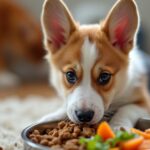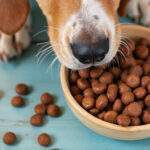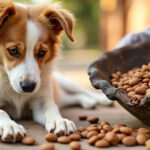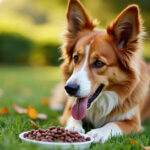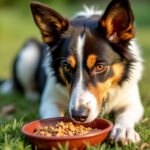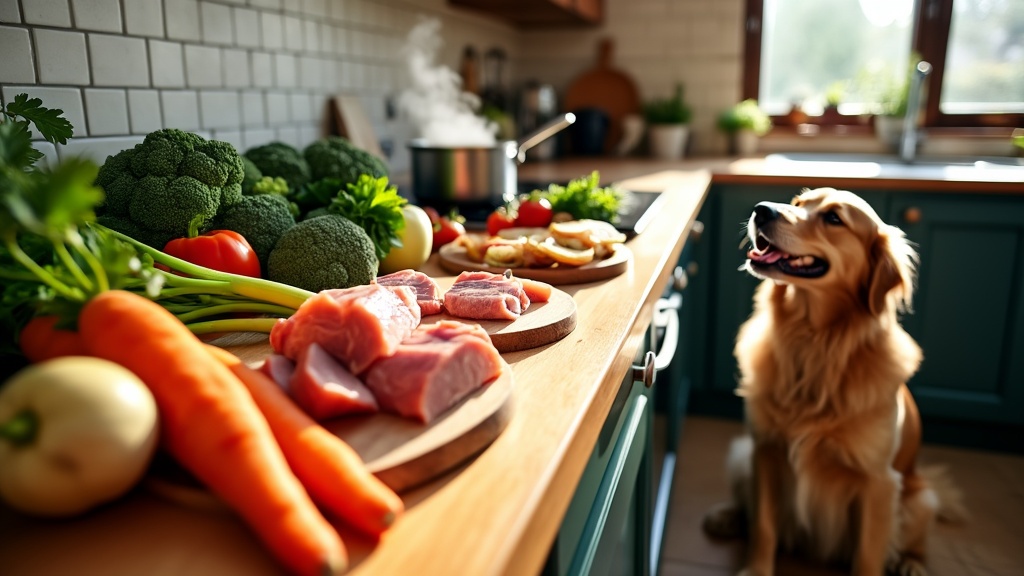Managing a dog with cancer involves providing a thoughtfully prepared homemade diet that can boost quality of life and support treatment. This diet helps maintain energy and potentially slow disease progression. Focusing on high-quality proteins, reducing carbohydrates, and adding anti-inflammatory and antioxidant-rich ingredients, owners can offer nutritional support that complements conventional plans.
Table of Contents
ToggleKey Takeaways
- Focus on balanced nutrition with high-quality proteins and fewer carbohydrates for cancer management in dogs.
- Include omega-3 fatty acids, antioxidants, and fiber for anti-inflammatory benefits and digestive health.
- Steer clear of processed foods and simple sugars to avoid fueling cancer cell growth.
- It’s essential to consult a veterinarian to craft a nutritionally balanced homemade diet.
- Homemade recipes should combine lean proteins, whole grains, and vegetables to support a dog’s health during treatment.
The Role of Diet in Dog Cancer Treatment
A balanced diet plays a crucial role in managing cancer in dogs. It supports the dog’s body by maintaining strength and combating cachexia, the severe weight loss and muscle wasting often seen in cancer patients. Proper nutrition is key. It ensures energy levels remain high and muscle mass is preserved.
Carbohydrates can feed cancer cells, so reducing their intake is beneficial. By cutting down on carbs, the growth of these harmful cells can be starved or slowed. This kind of dietary adjustment is a strategic defense for your pet.
The principles of Traditional Chinese Medicine suggest that food balances a dog’s Qi, Yin, Yang, and Blood. They’re all vital to health and could play an important role in treatment. Integrating these views into a dietary plan might offer nutritional and holistic benefits for your pet.
Understanding Nutritional Requirements
Dogs with cancer need a nutrition plan optimized to fight the disease and maintain their strength. They require high-quality proteins that are easy to digest and absorb. Chicken, turkey, pork, fish, and eggs provide essential amino acids, which are critical in supporting the immune system. Their diet should contain 30% to 40% protein on a dry matter basis, ensuring that their bodies receive adequate building blocks for tissue maintenance and repair.
Carbohydrate intake should be minimized to less than 25% dry matter. Cancer cells thrive on glucose, and by reducing the carbohydrate content, you limit their fuel source. Focus on sources of healthy fats, which should make up 25% to 40% of the diet’s dry matter content. Fats, particularly those found in fish and flaxseed oils, supply energy and have anti-inflammatory properties, potentially aiding in reducing tumor growth and enhancing overall health.
Fiber remains an essential component of a dog’s diet, especially for those with cancer. Aim for more than 2.5% dry matter fiber to promote digestive health and prevent gastrointestinal issues. A balanced diet that satisfies these nutritional requirements can help dogs manage their condition better, maintaining energy levels and overall well-being.
Beneficial Foods to Include
Including foods high in omega-3 fatty acids is a wise choice due to their anti-inflammatory benefits. Opt for sources like fish oil, sardines, salmon, and flaxseed oil. These can help manage inflammation, a common issue in dogs with cancer. Antioxidant-rich foods are also crucial. They combat oxidative stress and bolster the immune system. Consider adding berries, carrots, spinach, and sweet potatoes to your dog’s diet.
Cruciferous vegetables are another good option. They provide essential nutrients that can support overall health. Lastly, sweet potatoes and pumpkin, packed with vitamins, serve as fantastic additions. Their rich nutrient profile not only supplies vitamins but also fiber, aiding digestion. This combination of foods can offer significant benefits in supporting your dog’s health journey.
Foods to Avoid and Dietary Considerations
Feeding a dog with cancer requires careful selection of ingredients. Certain foods can exacerbate the condition. Processed foods should be avoided as they often contain artificial additives and preservatives that may encourage cancer cell growth. Foods high in simple sugars also pose a risk. These sugars rapidly metabolize into energy, which can provide fuel for cancer cells.
Considering a grain-free diet might be beneficial. However, if grains are included, opting for whole grains is crucial. Whole grains don’t spike blood sugar levels as quickly as refined options, reducing the chance of inadvertently supporting cancer cell proliferation.
A homemade diet can be a valuable part of managing a dog’s cancer, but it’s essential to consider nutrient balance. Consulting a veterinarian is critical in crafting a diet that prevents deficiencies. While proteins, healthy fats, and certain vegetables are beneficial, ensuring the right ratios of vitamins and minerals helps support overall health.
Key dietary considerations include:
- Avoiding processed foods and simple sugars.
- Choosing grain-free options or whole grains.
- Consulting with a veterinarian to ensure a balanced diet.
By adjusting their diet with attention and expertise, you can better address your dog’s specific nutritional needs during this challenging time.
Homemade Diet Recipes
Creating nutritious meals for dogs with cancer doesn’t have to be complicated. Here are simple recipes that balance essential nutrients, which you can easily prepare at home, and tailor to your dog’s taste and health needs.
Recipe 1: Rice and Protein Mix
Combine brown rice, scrambled eggs, a dash of flaxseed oil, steamed vegetables like carrots and broccoli, cottage cheese, and a choice of lean protein such as diced chicken or turkey. Each component contributes vital nutrients, supporting your dog’s health.
Recipe 2: Meat and Rice Delight
This dish features lean ground meat, cooked brown rice, a small portion of liver, and a splash of vegetable oil. This combination provides a robust profile of iron, protein, and healthy fats.
Recipe 3: Savory Hearty Blend
Start with high-quality dog food, adding a bit of vinegar, ground meat, chicken hearts, minced garlic, and recommended supplements for an added health boost. This recipe supports immunity and digestion. Adjust quantities based on your dog’s size and dietary needs.
Integrating supplements can boost a dog’s health when fighting cancer. Vitamin C bolsters the immune system, potentially aiding resistance against illness. Probiotics support gut health, essential for nutrient absorption and overall vitality. Adding omega-3 fatty acids offers anti-inflammatory benefits to help reduce pain and swelling.
Herbal Remedies
Herbal remedies can provide extra support. Goldenseal may help with infections, while Thuya and Silicea are often used for their reputed healing properties. However, it’s crucial to consult a vet before using these. Each dog’s condition and treatment plan is unique, and professional guidance ensures compatibility and safety.
Providing a homemade diet for dogs with cancer can be beneficial. It allows for control over the ingredients and nutrients, ensuring the meals cater specifically to the dog’s health requirements. These homemade recipes can serve as a foundation, but it’s important to consult a veterinarian to customize the diet further, ensuring all nutritional needs are met for a dog battling cancer.
Sources:
Frequently Asked Questions
What is the significance of a balanced diet in managing dog cancer?
A balanced diet is crucial in managing dog cancer as it helps maintain strength, combat cachexia, and ensure overall well-being by preserving muscle mass and energy levels.
Why should carbohydrate intake be minimized for dogs with cancer?
Carbohydrate intake should be minimized because cancer cells thrive on glucose, and reducing carbohydrates limits their fuel source, potentially slowing the growth of cancer cells.
How does Traditional Chinese Medicine view diet in the context of dog cancer treatment?
Traditional Chinese Medicine suggests that diet should balance a dog’s Qi, Yin, Yang, and Blood, which are essential for health and could play a role in cancer treatment.
What are the protein requirements for dogs with cancer?
Dogs with cancer require high-quality proteins that are easy to digest and absorb, with their diet containing 30% to 40% protein on a dry matter basis.
What kinds of fats are beneficial for dogs with cancer?
Healthy fats, especially those from sources like fish and flaxseed oils, are beneficial as they provide energy and have anti-inflammatory properties.
Why are omega-3 fatty acids recommended for dogs with cancer?
Omega-3 fatty acids are recommended due to their anti-inflammatory benefits, which can help manage inflammation and support overall health in dogs with cancer.
Which foods are rich in antioxidants and beneficial for dogs with cancer?
Antioxidant-rich foods such as berries, carrots, spinach, and sweet potatoes are beneficial as they combat oxidative stress and support the immune system.
What foods should be avoided when feeding a dog with cancer?
Processed foods, foods high in simple sugars, and refined grains should be avoided as they may encourage cancer cell growth or spike blood sugar levels.
Is a homemade diet beneficial for dogs with cancer?
A homemade diet can be beneficial if balanced correctly. Consulting a veterinarian is essential to ensure the proper nutrient balance and prevent deficiencies.
What are some simple homemade diet recipes for dogs with cancer?
Simple recipes include Rice and Protein Mix, Meat and Rice Delight, and Savory Hearty Blend, each featuring a combination of proteins, healthy fats, and vegetables tailored to support a dog’s nutritional needs.
Can herbal remedies be used for dogs with cancer?
Herbal remedies like Goldenseal, Thuya, and Silicea may offer support, but it’s crucial to consult a veterinarian before use to ensure safety and compatibility with the dog’s condition and treatment.
